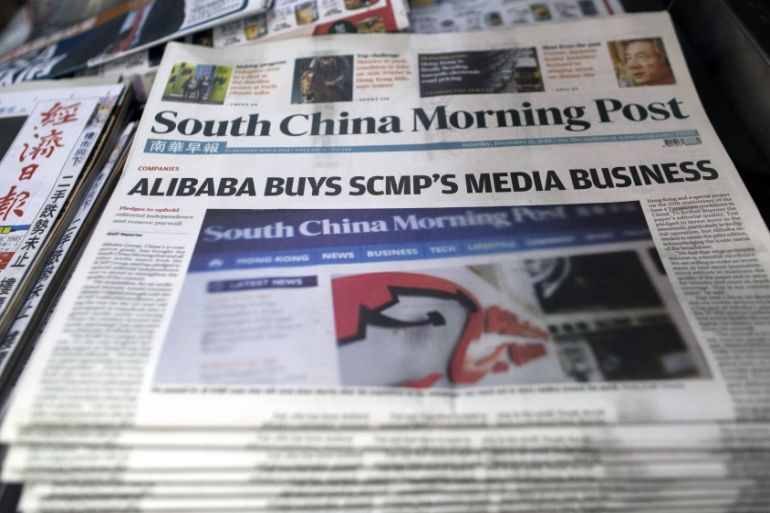Who bought the South China Morning Post?
The connection to the Chinese government did not go unnoticed.

As long as there have been newspapers, there have been rich men who wanted to own them. At one point Rupert Murdoch owned nearly a thousand. One of those was Hong Kong’s South China Morning Post (SCMP) – he sold it in 1993 to the Chinese-Malaysian tycoon Robert Kuok for $349m (the equivalent of $574m in today’s money). Now Kuok has unloaded the SCMP on Chinese internet company Alibaba, this time for just $266m.
The public face of Alibaba is its charismatic founder Jack Ma, China’s second richest man. Alibaba is often called the Amazon.com of China. It is also the eBay of China, the PayPal of China, and the YouTube of China. And unlike Amazon.com, Alibaba actually turns a profit.
Keep reading
list of 4 itemsCalifornia farmworkers cheer new housing in town scarred by mass shooting
Russia’s Putin eyes greater support from China for Ukraine war effort
India-Iran port deal: A gateway to Central Asia or a geostrategic headache?
Comparisons between Alibaba’s purchase of the SCMP and Amazon.com founder Jeff Bezos’ 2013 purchase of the The Washington Post are inevitable. The difference is that Bezos’ Amazon does not have strong support from the Chinese government, major funding from Chinese state-owned banks, close connections with the families of former Chinese leaders, and a cavalier attitude towards government repression. Alibaba has all these and more.
Another difference is that Bezos bought and owns The Washington Post, The United States’ leading capital newspaper, in a personal capacity. The Amazon.com corporation is not involved. The SCMP has been bought by Alibaba itself.
Verdicts on Bezos’ management of the Post are decidedly mixed, but no one sees his ownership as part of a government plot to control the news. The most serious accusation to date is that like any business owner Bezos might be reluctant to offend a major customer like the US government.
Editorial line
Alibaba’s ownership of the SCMP is an entirely different case. Though not a state-owned enterprise, in many ways Alibaba is the Chinese government, or at least is seen by outsiders as an agent of the Chinese government.
And unlike the US government, the Chinese government has no legal checks and balances to prevent state interference with the media. Quite the contrary: the Chinese government directly owns most of China’s news outlets. They are little more than propaganda machines.
The Chinese government's role in the SCMP deal may be at arm's length, but its hand can clearly be seen pulling the strings.
Will the Alibaba-owned SCMP toe the party line in reporting on China? Certainly. No one seriously doubts that, though astute observers have pointed out that the previous owners of the paper already held a pro-Beijing editorial line.
Chinese ownership of the SCMP is unlikely to have any effect on popular opinion in Hong Kong. People in Hong Kong are extraordinarily well-informed about China and, in any case, the SCMP publishes in English to a small group of Hong Kong’s business and intellectual elite. Hong Kong’s leading Chinese language newspapers have some 20 times the circulation of the SCMP.
Control of the SCMP gives Beijing an arm’s-length platform for spinning China’s version of world events to the rest of the English-speaking world outside Hong Kong. As Alibaba’s executive chairman Joseph Tsai said when announcing the purchase, “Western media organisations may not agree with the system of governance in China and that taints their view of coverage […] We see things differently.”
What to expect
That’s a strange statement coming from an e-commerce company, and an even stranger statement coming from its Taiwanese-Canadian executive chairman. But politics makes strange bedfellows, especially in China.
The politically mysterious Mr Tsai was born in Taiwan but is apparently a Canadian citizen. The Toronto Star reported in 2014 that “a spokeswoman for Alibaba refused to say where and when Tsai lived in Canada.”
OPINION: China and Taiwan: Normal is the new normal
There are large Taiwan and Hong Kong emigre communities in Vancouver. Tsai, who lives in Hong Kong and sponsors the city’s lacrosse team, is apparently connected with this group.
It seems more likely that Yale-educated Tsai is the mastermind behind Alibaba’s purchase of the SCMP than the sometimes eccentric Jack Ma. The cross-straits political triangle connecting Hong Kong, Taiwan and China is a murky pool, much deeper than the South China Sea itself.
OPINION: China’s regional isolation
Tsai’s position in it is far from clear. But for a Taiwan-born Canadian to accuse Western media organisations of tainted coverage of China is odd, to say the least.
The Chinese government’s role in the SCMP deal may be at arm’s length, but its hand can clearly be seen pulling the strings.

The first of those strings is removing the SCMP’s paywall. As Tsai said on announcing the purchase, the SCMP “is for everybody who cares to know more about China and to understand it – whether you are in New York or London or anywhere where English is spoken”. Removing the paywall means that anyone who can access the internet can access the SCMP.
People in Hong Kong see the SCMP – and its editorial perspective – every day on the streets of the city, on news billboards, and on local TV news. Alibaba’s purchase of the SCMP means that people all over the world will see the SCMP.
This is of little or no value to a Chinese internet company like Alibaba. But it may be very valuable to the Chinese government in shaping international perceptions of Hong Kong, China – and Taiwan.
Salvatore Babones is a comparative sociologist at the University of Sydney. He is a specialist on global economic structure.
The views expressed in this article are the author’s own and do not necessarily reflect Al Jazeera’s editorial policy.
